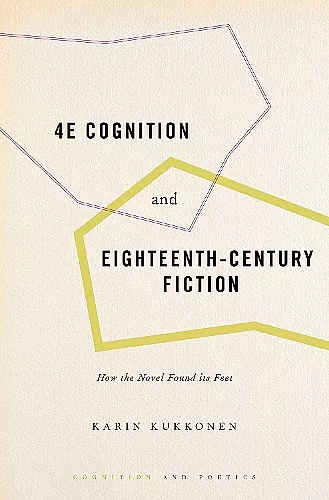4E Cognition and Eighteenth-Century Fiction
How the Novel Found its Feet
Format:Hardback
Publisher:Oxford University Press Inc
Published:28th Feb '19
Currently unavailable, and unfortunately no date known when it will be back

When the novel broke into cultural prominence in the eighteenth century, it became notorious for the gripping, immersive style of its narratives. In this book, Karin Kukkonen explores this phenomenon through the embodied style in Eliza Haywood's flamboyant amatory fiction, Charlotte Lennox's work as a cultural broker between Britain and France, Sarah Fielding's experimental novels, and Frances Burney's practice of life-writing and fiction-writing. Four female authors who are often written out of the history of the genre are here foregrounded in a critical account that emphasizes the importance of engaging readers' minds and bodies, and which invites us to revisit our understanding of the rise of the modern novel. Kukkonen's innovative theoretical approach is based on the approach of 4E cognition, which views thinking as profoundly embodied and embedded in social and material contexts, extending into technologies and material devices (such as a pen), and enactive in the inherent links between perceiving the world and moving around in it. 4E Cognition and Eighteenth-Century Fiction investigates the eighteenth-century novel through each of these trajectories and shows how language explores its embodied dimension by increasing the descriptions of inner perception, or the bodily gestures around spoken dialogue. The embodied dimension is then related to the media ecologies of letter-writing, book learning, and theatricality. As the novel feeds off and into these social and material contexts, it comes into its own as a lifeworld technology that might not answer to standards of nineteenth-century realism but that feels 'real' because it is integrated into the lifeworld and embodied experiences. 4E cognition answers one of the central challenges to cognitive literary studies: how to integrate historical and cultural contexts into cognitive approaches.
This study will be of particular interest to scholars working in the history of the novel and the history of emotions. The engagement with extended mind theorists will also be helpful for scholars interested in theorizing how the novel relates to other technologies that were emerging in the eighteenth century. Kukkonen's skilful interweaving of the participatory nature of eighteenth-century fiction, the theoretical tools of embodied cognition, and the particularities of the "eighteenth-century media ecology" demonstrates some of the ways in which scholars can use concepts from 4E cognition to produce insightful readings of eighteenth-century engagements with the body, with formal experimentation, and with the materiality of literary texts. * Collin Cook, Woosong University, Eighteenth-Century Fiction *
Professor Kukkonen is, instead, one of a handful of emerging scholars who are attempting to take the insights of literary scholars and historians as seriously as insights emerging from the social and hard sciences; this book is one sign of that project, and clearly demonstrates some of the potentials of tools drawn from a modern cognitivist narratology. * Sean Silver, Review of English Studies *
ISBN: 9780190913045
Dimensions: 163mm x 236mm x 31mm
Weight: 553g
272 pages